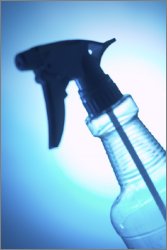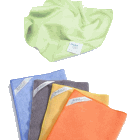Groundbreaking New Study Finds Household Cleaners & Air Fresheners Can Pose Serious Health Risks
by www.SixWise.com
Many people will not stop scouring, scrubbing and cleansing their homes until the scent of artificial pine, lemon and other disinfectant odors can be smelled in every room. But while this "clean" smell may in fact mean that germs have been eliminated, a new study reveals that it also means you've exposed yourself -- and your family -- to a healthy dose of toxins.
|

The cleaning products you use in your home may be exposing your family to toxic, cancer-causing substances. |
Researchers from the University of California-Berkeley and Lawrence Berkeley National Laboratory analyzed 21 household cleaners and air fresheners and found that many -- especially those with pine, lemon or orange scents -- emit excessive levels of toxic pollutants. This is the first study to measure household cleaner emissions during typical indoor use, as well as the potential related health risks.
Six of the products contained ethylene-based glycol ethers, which are classified as hazardous air pollutants by the U.S. Environmental Protection Agency. Meanwhile, 12 products contained terpenes, which are found in the pine, lemon and orange oils used to give cleaning products their "clean" smells. Terpenes have been found to react with ozone to produce a variety of toxic substances.
Of the four air fresheners included in the analysis, three contained significant amounts of terpenes. Adding to the problem is that many consumers are not aware that cleaning products and air fresheners represent a major source of indoor air pollution.
|

To protect your family's health, choose natural cleaning products or those that don't contain pine, orange or lemon scents. |
"On the one hand, they think `I'm cleaning germs,' which isn't a bad thing," said Gennet Paauwe, spokeswoman for the California Air Resources Board, which funded the study. "But what else are you doing in the process? You or your family members may be inhaling toxins while you're doing that."
Conclusion from the four-year study raised concerns among the researchers:
-
Cleaning a shower stall for 15 minutes with a product containing glycol ethers may result in exposures that are three times the recommended one-hour exposure limit.
-
People who clean houses professionally take in double the recommended formaldehyde (a known carcinogen) levels if they clean four homes a day, five days a week, 50 weeks a year. Their intake of fine particulate matter also exceeds the average federal guideline level for an entire year.
-
Using an air freshener along with an ozone-creating air purifier in a child's room may result in formaldehyde levels that are 25 percent higher than California recommends.
Another problematic scenario occurred when cleaning while outdoor ozone levels are high. If you were to stay in the kitchen for two hours after using a terpene-containing product, while ozone levels outdoors are high, you would inhale about one-quarter of the total daily guideline value for particulate matter in California.
If you'd like to know more, you can view the entire study, "Indoor Air Chemistry: Cleaning Agents, Ozone and Toxic Air Contaminants," here.
How to Keep Your Home Clean While Keeping Your Family Healthy
|
Reach a Deeper Level of Clean With PerfectClean
 Because PerfectClean cloths, dusters and mitts are made of ultramicrofibers that are only 3 microns in size (smaller than many bacteria!), you can use less chemical cleaner -- or even none at all. Because PerfectClean cloths, dusters and mitts are made of ultramicrofibers that are only 3 microns in size (smaller than many bacteria!), you can use less chemical cleaner -- or even none at all.
- Hospitals, schools & other commercial organizations that require ultra-clean environments use PerfectClean ultramicrofiber terry cloths over 100 TIMES before replacing them.
- Unlike the old common types of rags that simply spread microscopic contaminants around when you wipe with them, PerfectClean terry cloths hold fast to everything they pick up!
- Used wet with water or dry, you don't need to use chemical cleaners to achieve the deepest clean ... Traditional chemical-based cleaners can still be used, but you'll use considerably less as the ultramicrofiber can hold up to eight times its weight in liquid!
- PerfectClean products are hypoallergenic, perfect for those with allergies.
Learn more about PerfectClean cloths, dusters and mitts now! |
This report does not mean that you can no longer keep your home clean.
"My suggestion is don't stop cleaning, but clean with consciousness that cleaning products themselves contain materials that shouldn't be inhaled,'' said study author William Nazaroff, a professor of environmental engineering at UC-Berkeley.
To clean cautiously, Nazaroff suggested:
-
Keeping rooms adequately ventilated during and after cleaning
-
Using some products in diluted, rather than full-strength, form
-
Removing cleaning supplies from occupied rooms when you're done cleaning
-
Avoiding the use of ozone generators or ionizing air cleaners, particularly if terpene-containing products or air fresheners are also being used
Another option is to use PerfectClean cloths, dusters and mitts when you clean. PerfectClean terry cloths contain patented built-in antimicrobial protection and are made of ultramicrofibers that are only 3 microns in size, which is even smaller than many bacteria. Because of this unique ultramicrofiber construction, you can reduce the amount of chemical cleaners you use, or even eliminate them altogether.
So, unlike ordinary cleaning rags and sponges, you can use PerfectClean wet with water or dry, and you don't need to use chemical cleaners to achieve the deepest clean.
Finally, if you choose to use cleaning products, you can opt for natural varieties that do not contain glycol ethers or terpenes, but be sure to read the label to be sure. Also, choosing products that are not scented with orange, lemon or pine, or are fragrance free, may reduce your risks.
Recommended Reading
Air Pollution: Check to See What Grade Your County Received, and the Cleanest & Dirtiest Air in America
The Danger of Household Insecticides Confirmed in Recent Study: What You Can Do Instead
Sources
Mercury News May 23, 2006
UC Berkeley News May 22, 2006